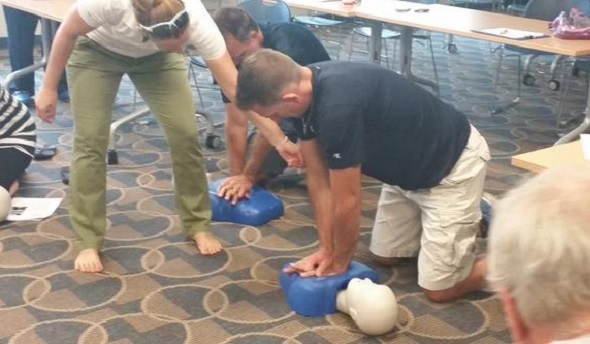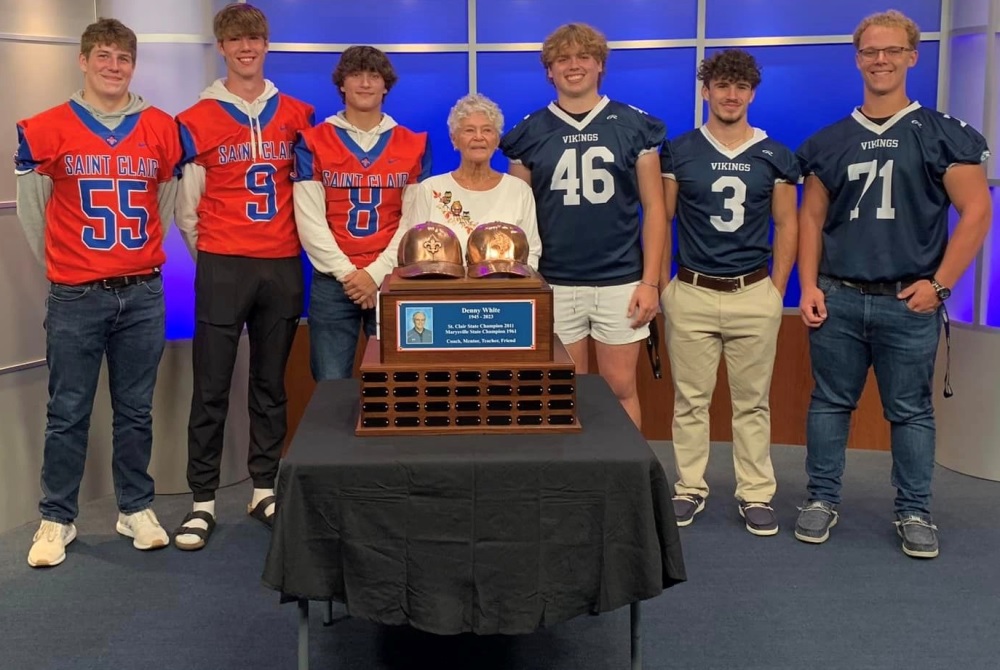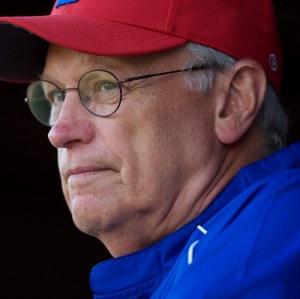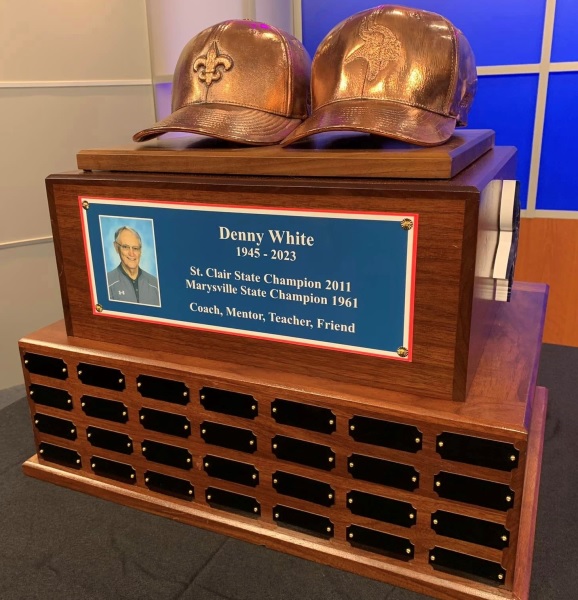
CPR Training, CAP Add to Preparedness
By
Geoff Kimmerly
MHSAA.com senior editor
October 12, 2015
A recent graduate from Ovid-Elsie High School named Chris Fowler started classes this fall at Michigan State University, his days representing the Marauders on the basketball court, football field and golf course now memories as he starts the next chapter of his young adult life.
But his story also will remain a reminder as his high school’s athletic department prepares each year to keep its athletes as safe as possible.
Three years ago next month, Fowler collapsed on the football practice field in cardiac arrest. The then-sophomore was brought back to life by two of his coaches, who revived him with CPR and an AED machine.
There’s no need for athletic director Soni Latz to recount the events of that day when explaining the importance of being ready to respond to a medical crisis – her coaches are well aware of why Fowler survived and understand completely why they too must be prepared.
“Everyone is very aware of what happened and the importance of being trained and knowing what to do, and actually feeling comfortable to step in and administer CPR when needed,” Latz said. “You can feel it’s never going to happen to you, but once it has, it makes you more aware and conscientious to be prepared.”
But Fowler’s story is worth noting on a larger level as varsity coaches at all MHSAA member schools are required this year for the first time to become certified in CPR, and as the largest classes in Coaches Advancement Program history begin course work that includes up to four modules designed to make them aware of health and safety situations that may arise at their schools as well.
The CPR requirement is the most recent addition to an MHSAA thrust toward raising expectations for coaches’ preparedness. The first action of this effort required all assistant and subvarsity coaches at the high school level to complete the same rules and risk minimization meeting requirement as high school varsity head coaches beginning with the 2014-15 school year.
The next action, following the CPR mandate, will require all persons hired as a high school varsity head coach for the first time at an MHSAA member school after July 31, 2016, to have completed the MHSAA’s Coaches Advancement Program Level 1 or Level 2.
In addition, MHSAA member schools this summer received the “Anyone can Save a Life” program, an emergency action plan curriculum designed by the Minnesota State High School League to help teams – guided by their coaches – create procedures for working together during medical emergencies.
“Coaches get asked to do a lot, and even if a school has an athletic trainer or some other health care professional, that person can’t be everywhere all the time. Coaches often are called upon to be prepared for (medical) situations,” said Gayle Thompson, an adjunct assistant professor at Albion College who formerly directed the athletic training program at Western Michigan University and continues to teach CAP sports medicine modules.
“The more (coaches) can learn to handle the situations that can inevitably arise, the better off they’re going to feel in those situations and the better care they’ll be able to offer their athletes. It’s proven that the faster athletes are able to get care, the quicker they’re able to come back to play.”
 Pontiac Notre Dame Prep – which has sent a number of coaches through the CAP program – began a focus on heart safety about five years ago after a student-athlete was diagnosed with a heart issue that allowed her to continue to play volleyball and softball, but not basketball. Athletic director Betty Wroubel said that prior to the student’s diagnosis, the school did provide training in CPR, AED use and artificial respiration; however, that situation put coaches and administrators further on the alert.
Pontiac Notre Dame Prep – which has sent a number of coaches through the CAP program – began a focus on heart safety about five years ago after a student-athlete was diagnosed with a heart issue that allowed her to continue to play volleyball and softball, but not basketball. Athletic director Betty Wroubel said that prior to the student’s diagnosis, the school did provide training in CPR, AED use and artificial respiration; however, that situation put coaches and administrators further on the alert.
Her school offers CPR training also to subvarsity and middle school coaches, using a combination of video instruction from the American Red Cross and in-person guidance by members of the school community who are certified to teach those skills. Students at the school also have received training – and it paid off a few years ago when one of them gave CPR to a baby who had stopped breathing at a local shopping mall.
Portage Central scheduled two sessions this fall for its coaches to receive not only CPR certification, but AED training as well. Central was fortunate to have an American Red Cross first-aid trainer in house, teacher Rachel Flachs, who also is close to the athletic side as the girls swimming and diving coach at Mattawan High School.
Central athletic director Joe Wallace said the training was offered not just to varsity head coaches, but every head coach on every level of the program so that “at least we know that at every given practice, every game, we’d have someone recently trained,” he said.
And he was proud of how his coaches immersed themselves in the subject matter.
“They were putting themselves in scenarios to see how it related to their own sports and asking really great questions,” Wallace said. “It was thought provoking.”
The CAP sports medicine modules are designed to do the same as coaches consider the medical situations they could face. They aren’t designed as “medical training,” said Tony Moreno, a professor of kinesiology at Eastern Michigan University and teacher of all four CAP sports medicine modules. Rather, attendees receive an awareness and basic education on common injuries, injury mechanisms and prevention, and how to create an action plan in the event of an injury incident.
The CAP program touches on a variety of safety topics in several of the available seven levels of coach education.
CAP 1 – which is part of the mandate for new coaches beginning next school year – includes “Sports Medicine and First Aid.” Cap 4 has modules titled “Understanding Athlete Development” and “Strength and Conditioning: Designing Your Program.” CAP 5 includes the session, “Peak Health and Performance.” Attendees also have the option of receiving CPR and AED training as an addition to some courses.
With a quick Internet search, coaches have no trouble finding a variety of resources on sports medicine, performance enhancement, nutrition and healthy living regarding young athletes. “However, some of these sources are more credible and scientifically-based in comparison to others,” Moreno said. “CAP strives on an annual basis to continue to update and improve the quality and credibility of this information and in a face-to-face manner where coaches have the opportunity to ask questions about their experiences and specific programs.”
“Having the CAP requirement will only make them better informed. Many have had this kind of information before, but there’s always something new coming,” Thompson added. “I think we do a good job, not of trying to tell them they were wrong, but maybe taking what they’ve known a step further and making them better prepared – empowering them to do their best.”
Wroubel may understand more than most athletic directors the growing list of tasks coaches are asked to accomplish; she’s also one of the winningest volleyball and softball coaches in MHSAA history and continues to guide both Fighting Irish programs.
But she and Wallace both said the CPR mandate isn’t considered another box to check on a to-do list; there’s enthusiasm because of its importance and the opportunity to carry those skills into other areas of community life as well.
Wroubel has served as a coach since 1975 and said this renewed emphasis on coaches having knowledge of sports medicine actually is a return to how things were when she started. Back then, coaches were responsible for being that first line of medical know-how, from taping ankles to providing ice and evaluating when their athletes should make a trip to the doctor’s office.
“When I first started coaching, we didn’t have sports medicine people, trainers, or team doctors other than for football. You did everything yourself,” Wroubel said. “I think everybody got away from that, but I think it’s coming back because a trainer can’t be everywhere.
“It’s healthy and it’s good for kids. … The more of us with emergency skills, the better we’re able to serve our community.”
PHOTOS: (Top) Portage Central coaches receive CPR training earlier this fall. (Middle) Pontiac Notre Dame Prep coaches practice during AED training. (Photos courtesy of school athletic departments.)

Marysville, St. Clair Join Together to Honor Beloved Coach with Rivalry Trophy
By
Paul Costanzo
Special for MHSAA.com
October 11, 2023
Denny White brought quite a bit to the Marysville and St. Clair communities.
 In 1961, as a junior in high school, White was part of the first team to bring a football state title to Marysville.
In 1961, as a junior in high school, White was part of the first team to bring a football state title to Marysville.
Fifty years later, as an assistant coach, he played a vital role in bringing St. Clair its first MHSAA Finals title in baseball.
During the years in between, and decade after, White brought his knowledge of and passion for those sports to hundreds of student athletes.
But most recently, he brought the two communities together.
This past Friday night, the rival schools played for the Denny White Trophy, an award created to honor the late coach and connect the two communities where he was most revered.
“I’m so happy with all the support that has been around the project,” said Brady Beedon, a family friend who helped to create the trophy and was in the booth calling Friday night’s game for Get Stuck On Sports. “It’s the least we could’ve done for a man who helped so many athletes. His legacy deserves to be preserved.”
In a fitting tribute to White, who died Jan. 22 of this year following a long battle with cancer, the two teams played a hard-fought game at East China Stadium, with White’s alma mater Marysville coming away with a 25-20 victory.
Both teams featured players who had been coached by White at some point in one or both of the sports, as his time on the bench lasted through the fall of 2022.
 That season, he coached the JV B football team at Marysville. Most recently before that, he had been the varsity baseball coach at St. Clair from 2015-21.
That season, he coached the JV B football team at Marysville. Most recently before that, he had been the varsity baseball coach at St. Clair from 2015-21.
“Not much can unify rivals, but Coach White’s influence goes beyond that rivalry,” Marysville football coach Derrick Meier said at a press conference unveiling the trophy. “He’s affected thousands of local athletes. … It is awesome that someone had such an influence across the board with all local athletes (in multiple) sports. I contacted him my first year coaching varsity, and he was not willing to leave where he was at. I called him three subsequent years; he graciously declined. The last year he did accept, we added a JV B team, his wisdom and knowledge went well beyond just coaching on the field. We’re all lucky for his influence.
“Heroes get remembered. Coach White will be remembered.”
White was a 1963 graduate of Marysville, who then attended Ferris State and Central Michigan. His coaching journey did not begin in the area where he grew up, however, as he coached baseball and football at Newaygo High School before coming to St. Clair.
He spent 35 years in the Saints athletic program, coaching baseball and multiple levels of football.
Much of his time was spent as the pitching coach for St. Clair for coaches Richie Mallewitz and Bill McElreath. That included the 2011 season, when his pitching staff included current major leaguer Jacob Cronenworth, who now plays second base for the San Diego Padres.
Also on that staff were Joel Seddon, who was drafted twice – once out of high school and again after college – and would go on to be the closer at South Carolina; and Jared Tobey, who pitched at Wayne State and was drafted by the Detroit Tigers, playing four years in their minor league system.
While White coached nearly 1,000 baseball games in his career, he was involved with more than just high school sports. He also coached a 13-year-old Little League team to a state title and the semifinals of the Great Lakes Regional in 2015.
 No matter the level, White poured all he had into coaching, and that included his final season on the sidelines at Marysville, just months prior to his passing.
No matter the level, White poured all he had into coaching, and that included his final season on the sidelines at Marysville, just months prior to his passing.
“Every single kid that he touched with that team, you could just tell, gravitated toward him immediately,” said Travis Disser, who coached with White that final year at Marysville. “His lessons and his light-hearted humor are just something that you can’t replace, or ever hope to. I was lucky enough to learn pitching from Coach White when I was a younger kid, as well. He was the exact same Denny White as he was all those years ago, as he was last year during his battle with cancer. Coach White was a warrior in every sense of the term. His lessons, both on the field and off the field from him, are something that I’ll never, ever forget.”
The idea to create the trophy honoring White came about not long after his death, as Beedon worked with Meier, former St. Clair athletic director Denny Borse and St. Clair assistant football coach T.J. Schindler to create and design the trophy.
The final product is a two-tiered trophy topped with a pair White’s hats – one from St. Clair, the other from Marysville – that have been bronzed. It includes the years in which he won his state titles at his respective schools, and a passage about his life. There is also room to list the yearly winners, as it is planned to represent the rivalry and shared respect for White in the two communities for years to come.
“Whether it was Little League kids over the last 20 years, or some of the football players and baseball players that he coached over the decades that he coached, all of them when they get together have great stories and fondness for all the memories that (White and his fellow coaches) helped them create,” said Sandy Rutledge, the current St. Clair athletic director and a longtime friend and colleague of White. “I think it’s awesome that now as we play for this trophy every year, it will give our coaches a chance to kind of explain who Coach was. The next generation, maybe they didn’t even know him, will know that he is a legend, and he’ll always be remembered.”
 Paul Costanzo served as a sportswriter at The Port Huron Times Herald from 2006-15, including three years as lead sportswriter, and prior to that as sports editor at the Hillsdale Daily News from 2005-06. He can be reached at [email protected] with story ideas for Genesee, Lapeer, St. Clair, Sanilac, Huron, Tuscola, Saginaw, Bay, Arenac, Midland and Gladwin counties.
Paul Costanzo served as a sportswriter at The Port Huron Times Herald from 2006-15, including three years as lead sportswriter, and prior to that as sports editor at the Hillsdale Daily News from 2005-06. He can be reached at [email protected] with story ideas for Genesee, Lapeer, St. Clair, Sanilac, Huron, Tuscola, Saginaw, Bay, Arenac, Midland and Gladwin counties.
PHOTOS (Top) From left: St. Clair’s Larry Wawryzniak, Liam Nesbitt and Peyton Ellis, Denny White’s wife Karen White, and Marysville’s Bryce Smith, Carter Saccucci and Caz Carty stand with the first-year traveling trophy celebrating Denny White’s coaching career. (Middle) White was a mainstay in the area’s sports community for more than six decades. (Below) The trophy celebrates his contributions to both schools and will list the winners of their annual football game. (Trophy photos courtesy of Brady Beedon. Headshot courtesy of the White family.)

